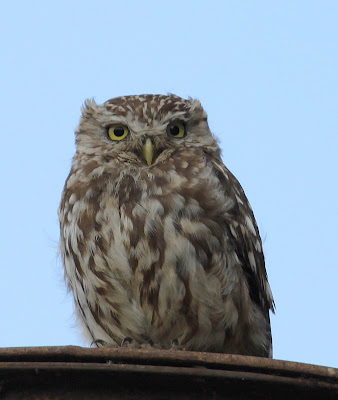A bright and breezy morning with an early tide dictated a quick look at a few local spots then a journey over Pilling Moss to our ringing site at Out Rawcliffe for essential maintenance work on net rides.
The medium tide at Knott End was enough to push about 260 Oystercatchers together, joined on the tideline by 15 Sandwich Terns, the terns all adults. Plenty of gulls on the beach, most of them on the still distant tideline but with no time or inclination to sift through them, I headed on up to Lane Ends for a stomp up the sea wall.
Small birds are hard to come by up here at the moment, with just small numbers of finches, larks and pipits e.g. 3 Linnet, 4 Goldfinch, 2 Meadow Pipit, 1 Pied Wagtail and 2 Skylark. At Pilling Water I saw a single Common Sandpiper, a handful of Redshank and 80+ Curlew, and waders too will be hard to find until the higher mid-week tides.
Skylark
Corvids brightened up the proceeding with firstly 2 Ravens flying over and then out to the bay, followed by a gang of Carrion Crows noisily dive bombing the trees. Upon investigation the fascination proved to be a Buzzard, sat on a fence post close up to the trees but watching the recently silaged field. Was the Buzzard on the lookout for game birds of which there are none at the moment, or studiously inspecting the bared grass for rodents, rabbits or earthworms as Buzzards habitually do? The Buzzard flew off at my appearance but on the return walk I saw it at Lane Ends where the same or different crows still harried it. Who’d be a Buzzard when seemingly the entire world is out to get you?
At Rawcliffe and after a summer of perpetual rain followed by a spot of sun the mist net rides sprout growth like never before, and it’s almost a full time job keeping the spaces open; a thankless task but someone has to do it, mainly Will but now me. Luckily there was a sheltered spot for a net away from the noise of the clipping and cutting where I caught a Sedge Warbler, a Chiffchaff and a Willow Warbler, allowing a welcome break from the gardening graft.
Sedge Warbler
Keep It Open
Willow Warbler
After a request from a blog reader, here are a couple of pictures which show how the wings of Willow Warbler and Chiffchaff differ. At this time of year adults of both species may be replacing a number of primary feathers, a process which can make the distinction less obvious if the vital 6th primary is missing.
Willow Warbler
Unfortunately the rain was on the way again, enough to abandon thoughts of ringing but not a good reason to stop work. In between bouts of work and the ringing a few other birds put in appearances: 2 Buzzard, 1 Sparrowhawk, 4 Whitethroat, 3 Willow Warbler, 3 Corn Bunting, 1 Great-spotted Woodpecker, 40+ Swallow and 4 Swifts, a hint of southerly movement with the latter two species.
I drove home across Union Lane hoping to see yesterday’s Marsh Harrier but found mainly Woodpigeons and Swallows.
No pictures of a Marsh Harrier then but on Another Bird blog there’s always another day, another picture and more birding chores to do.
























































.JPG)







.jpg)











